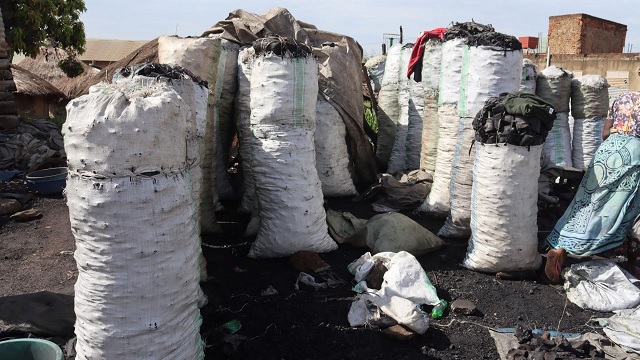
“Let’s stop lying to ourselves; charcoal is not going anywhere soon,” said Phosiso Sola, CIFOR’s team lead
Kampala, Uganda | THE INDEPENDENT | Environmental experts want a unified regional approach and sustainable production mechanisms to solve the persistent charcoal concerns in sub-Saharan Africa.
Charcoal remains deeply entrenched in the household energy mix across the region, despite environmental, health, and climate concerns.
This call was made during a lesson and knowledge-sharing forum on Thursday in Kampala. The event aimed at evaluating the impact of decade-long interventions on climate change mitigation and agroforestry.
Environmentalists from the Center for International Forestry Research (CIFOR) and the Food and Agriculture Organization (FAO) agreed that it is time for governments to candidly rethink charcoal policies and shift from denial to coordinated, evidence-based action if the resource is to be sustainably managed.
Uganda and Kenya recently instituted a charcoal ban as part of the efforts to curb deforestation, or loss of tree cover. Unsustainable charcoal burning has been blamed for the massive tree cutting.
The problem, however, is that charcoal remains the fuel of choice for most of the households that may not be able to afford cooking gas and electricity costs.
“Let’s stop lying to ourselves; charcoal is not going anywhere soon,” said Phosiso Sola, CIFOR’s team lead for natural resource governance and livelihoods development. “We need to acknowledge its importance in energy access and start building efficient, legal, and climate-sensitive charcoal value chains.”
Across Africa, millions of households rely on charcoal as their primary cooking fuel, particularly in urban and peri-urban areas where alternatives remain unaffordable or inaccessible. Despite years of political pledges to transition to cleaner energy, the use of charcoal continues to grow, underpinned by poverty, limited infrastructure, and weak governance.
“From 2000 to 2016, charcoal production across Africa did not decrease; it instead rose steadily,” Sola noted, referencing a CIFOR study tracking charcoal flows across the Democratic Republic of Congo, Uganda, Kenya, Nigeria, Chad, and Zambia.
“Even where bans exist, charcoal crosses borders as long as there is demand.”
She described how Kenya’s 2018 charcoal ban led to a spike in imports from Uganda and, later, the Democratic Republic of Congo and South Sudan.
The pattern highlights the need for a regional approach to regulation. “One country’s restriction becomes another’s burden. We must coordinate at the regional level or risk simply shifting environmental degradation across borders.”
Sola also emphasized that enforcement alone is not enough. Without alternative fuels and cooking technologies, households are forced to “stack” multiple energy sources—wood, charcoal, gas, and electricity—depending on cost and availability“. We all have a charcoal stove in our homes.
Transitioning to clean energy is a long way off. But while we wait, there are urgent short-term actions we can take,” she suggested.
“Improving carbonization techniques: Traditional kilns are inefficient and increase greenhouse gas emissions. Upgrading to improved kilns could boost charcoal yield by up to 50% and reduce emissions by 40%.”
She adds that agroforestry, managed woodlots, and the use of invasive species like Euphorbia can provide renewable sources of biomass, as well as investing in cleaner cook stoves, “More efficient stoves reduce wood consumption per meal, easing pressure on forests,” she noted.
She also proposed certifying sustainable charcoal, through tracking and labeling charcoal made from non-degraded sources, in order to promote responsible production and consumer awareness. “Policy has been too reactive,” Sola warned. “When Uganda cracked down on charcoal exports to Kenya, demand simply shifted to other countries. Without regional cooperation, these are short-term wins at best.”
Leonidas Hitimana, FAO Uganda’s head of forestry, echoed these priorities. “We are not going to run away from charcoal for at least 20 years,” he said. “But it’s possible to produce it in ways that do not harm the environment.”
Hitimana, revealed that FAO has supported the creation of bioenergy plantations and improved kilns, alongside efforts to rehabilitate degraded forests and use invasive species in central forest reserves for charcoal.
“Eleven producer associations in Uganda have already achieved quality certification from the Uganda National Bureau of Standards, he said.
“This is a strong example that charcoal can support livelihoods while safeguarding the environment if we put the right systems in place.”
Hitimana told URN that local governments must draft and enforce ordinances that set rules for sustainable charcoal production.
“Some districts have preliminary drafts, but national endorsement remains pending,” he said, calling on ministries of justice, environment, energy, and local government to coordinate. Efficient electric cookers and LPG can supplement charcoal use, particularly for certain cooking needs.
“In my own home, I use an electric pressure cooker. It’s cheaper than charcoal for some meals, but people don’t know that,” Hitimana shared.
Both experts agreed that charcoal bans without viable alternatives risk driving production underground, worsening illegal trade and forest degradation. They urge a multi-stakeholder platform involving ministries of forestry, energy, trade, and justice across East and Central Africa. “Charcoal value chains do not respect national borders. Our responses can’t either.”
As charcoal’s role in Africa’s energy landscape persists, the path forward lies not in banning it out of existence, but in managing it wisely, transparently, and collectively.
***
URN
 The Independent Uganda: You get the Truth we Pay the Price
The Independent Uganda: You get the Truth we Pay the Price





